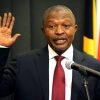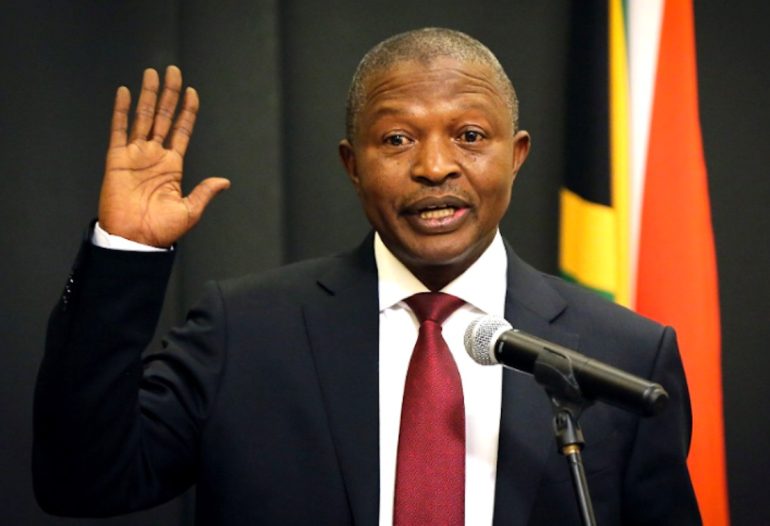Report reveals cops should not use automatic weapons during protests
By Kaya 959 News
A report has revealed that automatic weapons should not be used for crowd management. The report of the Panel of Experts on Policing and Crowd Management was released by South Africa’s Minister of Police Bheki Cele. The panel was set up in April 2016 under Judge David Ntshangase, in line with the recommendations of the Marikana Commission of Inquiry. The commission was established after police killed 34 striking miners at Marikana in August 2012.
The report has been welcomed by the Institute for Security Studies and, according to ISS’s Gareth Newham, presents a significant opportunity to start a process that reimagines and renews policing in South Africa.
The report noted that most protests in South Africa are peaceful, and peaceful protestors should not be deprived of their right to protest by the violent conduct of others. The potential for violence should be minimised through negotiation and de-escalation measures. Police should avoid indiscriminate use of force, and where force is necessary it should be targeted only against those involved in violence.
15 basic human rights every South African should know about
Newham explained that the police priority at Marikana should have been to ensure no further loss of life in a complex situation where some police and strikers had already died.
But the police operation was led by an officer with no recent training or experience in crowd management, planning was rushed, and commanders knew deaths were likely to follow, the panel’s 595-page report said.
The Marikana police operation primarily relied on tactical units armed with high-velocity R5 rifles capable of automatic fire. There was a lack of discipline and poor police communication, and police undermined their own negotiations, the report said. Few of the police had first aid training, and they did not believe they had a duty to assist people shot by their colleagues.
The aim of the panel was to provide recommendations to help the South Africa Police Service to become more professional, promote public safety and uphold the rights of all people in SA. A key focus of the panel’s report is on public order policing and crowd management. Its report said current guidance to police regarding use of force was inadequate and that protection of life should be a guiding principle.
Newham who heads up the ISS Justice and Violence Prevention programme, said the report is released at an important time following a long decline in policing and public safety.
He said the panel called for a professional, demilitarised and accountable police service led by experienced, competent, honest and credible leadership and for a system of crowd management that respects the Constitutional right to freedom of assembly.
“The SAPS is facing significant organisational challenges that prevent the most effective use of its current R101 billion budget. Most notable is the declining ability to bring to justice the perpetrators of violent crimes like murder, robbery and rape. In addition, SAPS are increasingly confronted by a large and growing number of public order incidents each year,” Newham said.
He added that many hard working and honest police officers are inadequately equipped, supported and rewarded.
“We’ve seen a recent and worrying spike in the killings of police officials, and too few police officials who act unlawfully are held accountable,” Newham said.
The panel included top local and international police officers, police unions, and non-government experts. Its report makes 136 recommendations aimed at improving police professionalisation, accountability and integrity, and enabling SAPS to better manage protests by improving training and equipment and amending laws and regulations.
It calls for greater police competence and accountability in a professional and demilitarised service, and says use of force should comply with human rights principles and focus on protection of life. It noted that police have a duty to care for injured persons. The panel found SAPS culture does not value honesty or support critical reflection when things go wrong.
Image Credit: Pexels
Written by: Anthea
Bheki Cele Protests protests South Africa SAPS South African Police
Similar posts
MORE ARTICLES

‘How are you 48?’ – Loyiso Bala showers wife Jennifer with birthday love

Former deputy president David Mabuza dies aged 64

WATCH: Sello Maake KaNcube on the stage play ‘Master Herold and the boys’ & the joys of his acting career

Kenyan Supreme Court grants inheritance rights to children born out of wedlock

WATCH: Castrol FastScan Mechanics Meet ups | Randburg
QUICK LINKS
UpComing Shows

959 Music Weekdays
Kaya 959 Hits
Real. Familiar. Memorable. Kaya 959 brings you the music you know and love from our playlist. Uninterrupted. Thursdays 20h00 to 21h00
close
The Best T in the City
With T Bose
He has held it down in the world of mid-morning radio with the best music, riveting topics, brilliant mixes and interesting guests. Every weekday, The Best T proves why he is the BEST by connecting to you like only your bro or favourite uncle could. He lets his listeners dictate the songs they want to hear in the ever-popular Top 10 at 10, and his Three Teaspoons never run out. Catch The Best T in the City Mondays to Fridays from 09h00 to 12h00.
close
Feel Good
With Andy Maqondwana
Feel good about feeling good! That's exactly what The Feel-Good show is about. An escape from the negativity that surrounds us, indulging you in good feels. Pass it on to one and all. Spread the good feeling around Gauteng with Andy Maqondwana.
close
The Hive
With Bonolo "Bee Sting" Molosiwa
Every "Hive" needs a Queen B and Bonolo "Bee Sting" Molosiwa is Kaya 959's honey who brings in the money. With her bubbly personality, infectious laugh, Bee Sting radiates positive energy which is all you need to get your weekend off to the best start. Don't miss the Afrobeat Dancehall Ragga (ADR) Top 10 on The Hive with Bee Sting every Saturday from 18h00 - 21h00.
closeConnect with Kaya 959
DownLoad Our Mobile App
© 2025 Kaya 959 | On The Street On The Air










